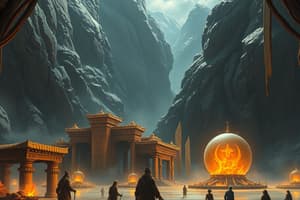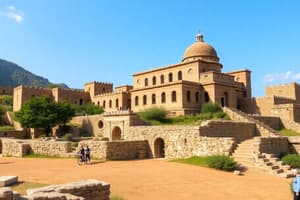Podcast
Questions and Answers
What is the primary focus of the study of history?
What is the primary focus of the study of history?
- The analysis of ancient texts
- Understanding how past events shape present and future societies (correct)
- The development of technological advancements
- The study of economic systems in the past
Which period is characterized by the rise of feudalism and the Crusades?
Which period is characterized by the rise of feudalism and the Crusades?
- Ancient History
- Medieval History (correct)
- Prehistory
- Early Modern Period
What distinguishes primary sources from secondary sources in historical research?
What distinguishes primary sources from secondary sources in historical research?
- Primary sources are always more reliable than secondary sources.
- Primary sources are original documents or evidence from the time. (correct)
- Primary sources are accounts written by historians.
- Primary sources are secondary interpretations of events.
Which civilization is NOT classified as part of Ancient History?
Which civilization is NOT classified as part of Ancient History?
What was a significant outcome of the Fall of the Roman Empire?
What was a significant outcome of the Fall of the Roman Empire?
Who is known for his role in spreading Hellenistic culture?
Who is known for his role in spreading Hellenistic culture?
What major cultural movement began around 1500 CE, leading to significant changes in art and science?
What major cultural movement began around 1500 CE, leading to significant changes in art and science?
Which of the following themes in history focuses on the struggles for civil rights?
Which of the following themes in history focuses on the struggles for civil rights?
How did the Agricultural Revolution impact societies?
How did the Agricultural Revolution impact societies?
What is historiography primarily concerned with in the study of history?
What is historiography primarily concerned with in the study of history?
What role did the Cold War play in history?
What role did the Cold War play in history?
Which of the following best describes the Modern History period?
Which of the following best describes the Modern History period?
Which method of study emphasizes collaborating with others?
Which method of study emphasizes collaborating with others?
What aspect of history does the theme of Economics primarily focus on?
What aspect of history does the theme of Economics primarily focus on?
Flashcards are hidden until you start studying
Study Notes
Overview of History
- Definition: History is the study of past events, particularly in human affairs.
- Purpose: To understand how past events shape present and future societies.
Major Periods in History
-
Prehistory:
- Time before written records.
- Includes the Stone Age, Bronze Age, and Iron Age.
-
Ancient History:
- Approximately 3000 BCE to 500 CE.
- Key civilizations: Mesopotamia, Ancient Egypt, Indus Valley, Ancient China, and the Greeks and Romans.
-
Medieval History:
- Roughly 500 CE to 1500 CE.
- Features include feudalism, the rise of Islam, and the Crusades.
-
Early Modern Period:
- 1500 CE to 1800 CE.
- Marked by the Renaissance, Reformation, and exploration.
-
Modern History:
- 1800 CE to present.
- Characterized by industrialization, colonization, world wars, and technological advancements.
Key Concepts in History
- Chronology: The arrangement of events in order of occurrence.
- Historiography: The study of how history is written and interpreted.
- Primary Sources: Original documents or evidence from the time (e.g., diaries, artifacts).
- Secondary Sources: Analyses or interpretations of primary sources (e.g., textbooks, articles).
Important Historical Figures
- Alexander the Great: Conqueror and spreader of Hellenistic culture.
- Julius Caesar: Roman general and statesman; pivotal in the rise of the Roman Empire.
- Confucius: Chinese philosopher whose teachings influenced East Asian cultures.
- Napoleon Bonaparte: French military leader and emperor known for his role in the French Revolution.
Historical Methodology
- Research: Gathering information from various sources.
- Analysis: Interpreting data to derive conclusions about past events.
- Presentation: Communicating findings through written or spoken formats.
Impact of History
- Cultural Understanding: Provides insights into human behavior and societal development.
- Lessons Learned: Helps societies avoid repeating past mistakes.
- Identity: Shapes national and cultural identities.
Events that Shaped History
- The Agricultural Revolution: Transition from nomadic to settled farming societies.
- The Fall of the Roman Empire: Led to the rise of medieval Europe.
- World Wars: Redefined global power dynamics and international relations.
- The Cold War: Influenced political ideologies and conflicts in the late 20th century.
Themes in History
- Conflict and War: Examining causes, effects, and resolutions.
- Religion: Role in governance, society, and culture.
- Economics: Trade, industry, and the evolution of economic systems.
- Social Movements: Struggles for civil rights, gender equality, and social justice.
Methods of Study
- Reading: Engaging with books, articles, and primary documents.
- Discussion: Collaborating with others to deepen understanding.
- Fieldwork: Visiting historical sites for practical learning.
- Writing: Articulating thoughts and analyses through essays and reports.
Overview of History
- History examines past events, particularly focusing on human activities.
- It aims to understand how historical occurrences influence present and future societal dynamics.
Major Periods in History
- Prehistory: Encompasses eras before written records, including the Stone Age, Bronze Age, and Iron Age.
- Ancient History: Spans from approximately 3000 BCE to 500 CE, featuring civilizations such as Mesopotamia, Ancient Egypt, Indus Valley, Ancient China, Greeks, and Romans.
- Medieval History: Lasting from about 500 CE to 1500 CE, highlighted by feudalism, the emergence of Islam, and the Crusades.
- Early Modern Period: Covers 1500 CE to 1800 CE, marked by the Renaissance, Reformation, and exploratory voyages.
- Modern History: Encompasses 1800 CE to the present, characterized by industrialization, colonization, global conflicts (world wars), and major technological advancements.
Key Concepts in History
- Chronology: Arranging historical events according to their occurrence in time.
- Historiography: Analyzing how history is recorded, interpreted, and re-evaluated over time.
- Primary Sources: Original materials from the period of study, such as diaries and artifacts.
- Secondary Sources: Interpretative works based on primary sources, including textbooks and scholarly articles.
Important Historical Figures
- Alexander the Great: Known for his expansive conquests and the spread of Hellenistic culture across multiple regions.
- Julius Caesar: A key figure in the transition to the Roman Empire; notable general and political leader.
- Confucius: Influential Chinese philosopher whose ideas profoundly impacted East Asian societies and ethics.
- Napoleon Bonaparte: A significant military and political leader pivotal in shaping modern France and Europe during and after the French Revolution.
Historical Methodology
- Research: Involves the systematic collection of information from differing sources to build a factual basis for historical study.
- Analysis: Evaluating and interpreting collected data to derive insights about historical events and their implications.
- Presentation: Structuring and sharing findings effectively through written or oral communication.
Impact of History
- Cultural Understanding: Offers insights into human actions, behavior, and societal evolution over time.
- Lessons Learned: Aids societies in recognizing and avoiding the pitfalls of previous mistakes.
- Identity: Helps shape and define national and cultural identities within various communities.
Events that Shaped History
- The Agricultural Revolution: Triggered the shift from nomadic lifestyles to stable agricultural societies, enabling population growth and societal complexity.
- The Fall of the Roman Empire: Catalyst for the emergence of medieval societies and new political structures in Europe.
- World Wars: Drastically altered global power balances and led to new international dynamics.
- The Cold War: Shaped political ideologies and led to numerous conflicts during the latter half of the 20th century.
Themes in History
- Conflict and War: Investigates the origins, developments, and resolutions of historical conflicts.
- Religion: Examines its influence on governance, societal norms, and cultural practices.
- Economics: Analyzes the evolution of trade systems and economic practices throughout history.
- Social Movements: Studies the quest for civil rights, social justice, and equity within societies.
Methods of Study
- Reading: Involves studying books, articles, and original documents to gain knowledge of historical contexts.
- Discussion: Encourages collaborative dialogue to enhance understanding and perspective on historical events.
- Fieldwork: Engages learners with practical experiences by exploring historical sites and artifacts.
- Writing: Focuses on developing and expressing analytical thoughts through essays and research reports.
Studying That Suits You
Use AI to generate personalized quizzes and flashcards to suit your learning preferences.



